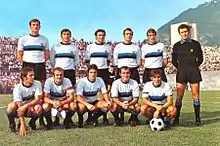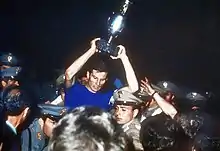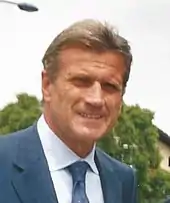Giacinto Facchetti
Giacinto Facchetti (Italian pronunciation: [dʒaˈtʃinto fakˈketti]; 18 July 1942 – 4 September 2006) was an Italian footballer who played as a defender for Inter Milan from 1960 to 1978. He later served as Inter chairman from January 2004 until his death in 2006. He played 634 official games for the club, scoring 75 goals, and was a member of "Grande Inter" team under manager Helenio Herrera which won four Serie A titles, a Coppa Italia, two European Cups, and two Intercontinental Cups. He placed second for the Ballon d'Or in 1965.
 Facchetti with Inter Milan in the 1966–67 season | ||||||||||||||||||||||
| Personal information | ||||||||||||||||||||||
|---|---|---|---|---|---|---|---|---|---|---|---|---|---|---|---|---|---|---|---|---|---|---|
| Full name | Giacinto Facchetti[1] | |||||||||||||||||||||
| Date of birth | 18 July 1942 | |||||||||||||||||||||
| Place of birth | Treviglio, Italy | |||||||||||||||||||||
| Date of death | 4 September 2006 (aged 64) | |||||||||||||||||||||
| Place of death | Milan, Italy | |||||||||||||||||||||
| Height | 1.91 m (6 ft 3 in) | |||||||||||||||||||||
| Position(s) | Left-back | |||||||||||||||||||||
| Youth career | ||||||||||||||||||||||
| 1956–1960 | Trevigliese | |||||||||||||||||||||
| Senior career* | ||||||||||||||||||||||
| Years | Team | Apps | (Gls) | |||||||||||||||||||
| 1960–1978 | Inter Milan | 476 | (59) | |||||||||||||||||||
| National team | ||||||||||||||||||||||
| 1963–1977 | Italy | 94 | (3) | |||||||||||||||||||
Honours
| ||||||||||||||||||||||
| * Senior club appearances and goals counted for the domestic league only | ||||||||||||||||||||||
Facchetti represented Italy internationally on 94 occasions, including three FIFA World Cups. He was also elected to the 1970 World Cup All-Star Team, in which Italy were runners-up. He was also captain of the national side that won Italy's first ever UEFA European Championship on home soil in 1968, where he was also elected to the team of the tournament.
Facchetti is remembered as one of the first truly great attacking full-backs. He is regarded as one of the best ever at his position, due to his pace, technique, intelligence, physique, and stamina. He formed a formidable defensive partnership with fellow full-back Tarcisio Burgnich in Inter's defensive catenaccio system and with the Italian national side. In addition to his ability on the pitch, Facchetti was lauded for his discipline and leadership and captained both Inter Milan and Italy for several years.[2][3][4][5][6]
In March 2004, Pelé named him one of the Top 125 greatest living footballers as part of FIFA's 100th anniversary celebrations.[7] In 2015, he was posthumously inducted into the Italian Football Hall of Fame.
Club career

Born in Treviglio, in the Province of Bergamo (Lombardy), Facchetti began his career with his hometown club, Trevigliese, as a forward, due to his pace, powerful shot, and technique. He was soon noticed by Helenio Herrera, then manager of Inter, who launched him in Serie A in the late 1960–61 season as an attacking full-back on the left, due to his physique, energy, and tackling ability, in addition to his offensive attributes; he made his club and top-flight debut on 21 May 1961, in a 2–0 away win over Roma.[4] The change of role proved to be an effective choice, and eventually Facchetti developed into one of the most effective defenders in Italian football, forming a notable partnership in defence with fellow Italian full-back Burgnich. Facchetti's innovative playing style as one of the first European overlapping full-backs, combining hard defending with offensive prowess, played a key role in the defensive, yet counter-attacking "catenaccio" system of Herrera's "Grande Inter" side that dominated Italian, European, and World Football in the 60s; whilst conceding few goals defensively, Facchetti was also able to contribute offensively with numerous goals and assists.[3][5][6][8][9] He held the record for most goals in a single Serie A season by a defender, with 10 goals scored during the 1965–66 season, until it was broken by Marco Materazzi during the 2000–01 season.[10]
Facchetti spent his entire professional career with Inter, later captaining the side, after Armando Picchi, Mario Corso, and Sandro Mazzola, during his final season with the club, between 1977–78. With his club, Facchetti won four scudetti in 1963, 1965, 1966 and 1971; one Italian Cup in 1978; two European Cups in 1964 and 1965; and two Intercontinental Cups in 1964 and 1965.[3][8] Due to his performances for Inter, Facchetti also narrowly missed the opportunity to become the first defender to win the Ballon d'Or, placing second in 1965, after narrowly missing out on a treble winning season with Inter that year; Inter won the Serie A and the European Cup, but were defeated in the 1965 Coppa Italia final by Juventus. Facchetti's 59 goals in Serie A make him the most prolific defender in the history of the Italian league.[10]
International career

Facchetti made his debut for Italy on 23 March 1963, in a 1–0 away win in a European qualifier against Turkey. He was capped 94 times (a record at the time, since overtaken only by Dino Zoff, Paolo Maldini, Fabio Cannavaro and Gianluigi Buffon) wearing the captain's armband 70 times and scoring three goals between 1963 and 1977; he is currently his nation's ninth-highest appearance holder. He played for his country at the 1966, 1970, and 1974 FIFA World Cups, captaining Italy in the latter two editions of the tournament. Facchetti also captained the Italian squad to victory at Euro 1968, wearing the number 10 shirt, after advancing to the finals by calling the coin toss correctly following extra time against the Soviet Union, before winning the final over Yugoslavia 2–0 in the replay match,[11] as well as being named to the Team of the Tournament. He was also named to the Team of the Tournament in the 1970 World Cup, where he helped his team to the final of the tournament, only to be defeated 4–1 by Brazil.[3][8]
Style of play
Regarded as one of the greatest full-backs of all time, Facchetti's pace, stamina, power, and excellent physical and technical traits allowed him to excel as an offensive full-back or wing-back; a former forward and midfielder, he was known for his ability to make attacking runs down the left flank and get into good offensive positions in the area which allowed him to either score or assist goals, due to his powerful shot and crossing ability, and was known for his tendency to cut into the centre in order to strike on goal, which was very unusual for full-backs at the time.[2][3][4][10][12][13][14][15] A strong, large, elegant, and hard-working footballer, who was good in the air, he was highly regarded for his ability with either foot, as well as his distribution, and ball skills; he also excelled defensively, playing as a sweeper as he lost some of his pace later in his career, due to his technical skills, distribution, intelligence and ability to read the game or start plays from the back after winning back the ball, as well as his man-marking ability, positioning, anticipation and tackling.[5][13][15][16] A precocious talent in his youth, he also stood out for his longevity in his later career.[13] In addition to his footballing ability, he was also known for his correct behaviour on the pitch, as well as his leadership;[2][6][15] he was sent off only once throughout his entire career, for sarcastically applauding the referee.[5]
After retirement

Over the years Facchetti held various managerial positions at Inter Milan, including technical director,[8][17] board member,[18] worldwide ambassador and vice-chairman.[18] Facchetti was elected chairman of Inter on 19 January 2004, following the resignation of previous president Massimo Moratti.[17][19] After a long illness, he died of pancreatic cancer in Milan on 4 September 2006. He is survived by his wife, Giovanna, and four children.[5][8]
Legacy
In March 2004, Pelé named Facchetti one of the Top 125 greatest living footballers as part of FIFA's 100th anniversary celebrations.[7]
.jpg.webp)
Following Facchetti's death in 2006, he was named one of the year's Golden Foot "Football Legends", and was also the recipient of the FIFA Presidential Award. Known for his discipline as well as his playing ability throughout his career, the Premio internazionale Giacinto Facchetti was also established in his honour later that year, and is currently awarded annually to a football personality who was stood out for their honesty, correct behaviour, and sportsmanship.[20] Also after his death, the Campionato Nazionale Primavera included Facchetti's name for the official renaming of the championship to Campionato Primavera Tim – Trofeo Giacinto Facchetti.
His former club, Inter, posthumously retired the number 3 shirt in his honour.[8]
On 22 September 2008, a square in the town of Cesano Maderno, Metropolitan City of Milan, was renamed in honour of Giacinto Facchetti.[8][21]
Facchetti is featured in the football video game FIFA 14's Classic XI – a multi-national all-star team, along with compatriots Bruno Conti, Gianni Rivera, and Franco Baresi.[22]
In 2015, he was posthumously inducted into the Italian Football Hall of Fame.[23]
Career statistics
Club
| Club performance | League | Cup | Continental | Total | ||||||
|---|---|---|---|---|---|---|---|---|---|---|
| Season | Club | Division | Apps | Goals | Apps | Goals | Apps | Goals | Apps | Goals |
| Italy | League | Coppa Italia | Europe | Total | ||||||
| 1960–61 | Inter Milan | Serie A | 3 | 1 | – | 1 | 0 | 4 | 1 | |
| 1961–62 | 15 | 0 | – | 6 | 0 | 21 | 0 | |||
| 1962–63 | 31 | 4 | 2 | 0 | – | 33 | 4 | |||
| 1963–64 | 33 | 4 | – | 9 | 0 | 42 | 4 | |||
| 1964–65 | 32 | 2 | 3 | 0 | 6 | 1 | 41 | 3 | ||
| 1965–66 | 32 | 10 | 1 | 0 | 5 | 2 | 38 | 12 | ||
| 1966–67 | 34 | 4 | 2 | 0 | 10 | 2 | 46 | 6 | ||
| 1967–68 | 28 | 7 | 9 | 2 | – | 37 | 9 | |||
| 1968–69 | 30 | 6 | 3 | 1 | – | 33 | 7 | |||
| 1969–70 | 28 | 5 | 6 | 1 | 8 | 0 | 42 | 6 | ||
| 1970–71 | 30 | 5 | 3 | 0 | 2 | 0 | 35 | 5 | ||
| 1971–72 | 27 | 4 | 8 | 1 | 9 | 1 | 44 | 6 | ||
| 1972–73 | 29 | 1 | 10 | 3 | 5 | 0 | 44 | 4 | ||
| 1973–74 | 28 | 2 | 7 | 0 | 2 | 0 | 37 | 2 | ||
| 1974–75 | 23 | 0 | 8 | 1 | 3 | 0 | 34 | 1 | ||
| 1975–76 | 28 | 3 | 10 | 0 | – | 38 | 3 | |||
| 1976–77 | 27 | 1 | 9 | 1 | 1 | 0 | 37 | 2 | ||
| 1977–78 | 18 | 0 | 4 | 0 | 1 | 0 | 23 | 0 | ||
| Total | Italy | 476 | 59 | 85 | 10 | 68 | 6 | 629 | 75 | |
| Career total | 476 | 59 | 85 | 10 | 68 | 6 | 629 | 75 | ||
International
| Italy national team | ||
|---|---|---|
| Year | Apps | Goals |
| 1963 | 5 | 0 |
| 1964 | 4 | 1 |
| 1965 | 7 | 1 |
| 1966 | 10 | 0 |
| 1967 | 6 | 1 |
| 1968 | 6 | 0 |
| 1969 | 6 | 0 |
| 1970 | 11 | 0 |
| 1971 | 6 | 0 |
| 1972 | 3 | 0 |
| 1973 | 7 | 0 |
| 1974 | 6 | 0 |
| 1975 | 6 | 0 |
| 1976 | 7 | 0 |
| 1977 | 4 | 0 |
| Total | 94 | 3 |
International goals
| # | Date | Venue | Opponent | Score | Result | Competition | |||||
|---|---|---|---|---|---|---|---|---|---|---|---|
| 1. | 4 November 1964 | Stadio Luigi Ferraris, Genoa, Italy | 6–1 | Win | 1966 FIFA World Cup Q. | ||||||
| 2. | 7 December 1965 | Stadio San Paolo, Naples, Italy | 3–0 | Win | 1966 FIFA World Cup Q. | ||||||
| 3. | 22 March 1967 | GSP Stadium, Nicosia, Cyprus | 0–2 | Win | Euro 1968 Q. | ||||||
| Correct as of 13 January 2013[29] | |||||||||||
Honours
Inter Milan[17]
- Serie A: 1962–63, 1964–65, 1965–66, 1970–71
- Coppa Italia: 1977–78
- European Cup: 1963–64, 1964–65
- Intercontinental Cup: 1964, 1965
Italy[30]
- FIFA World Cup runner-up: 1970
- UEFA European Championship: 1968
Individual
- FIFA 100 (125 greatest living players, as selected by Pelé): 2004[7]
- Golden Foot "Football Legends": 2006[31]
- FIFA Presidential Award: 2006[32]
- UEFA European Championship Team of the Tournament: 1968[30]
- FIFA World Cup All-Star Team: 1970[33]
- Ballon d'Or (runner-up): 1965[34]
- Italian Football Hall of Fame: 2015[23]
- Inter Milan Hall of Fame: 2019[35]
Orders
References
- "Comunicato Ufficiale N. 249" [Official Press Release No. 249] (PDF) (in Italian). Lega Serie A. 13 February 2004. p. 3. Retrieved 14 December 2020.
- "Italy's greatest defenders". Sky Sports. 31 May 2010. Retrieved 26 January 2016.
- "Inter and Italy's pioneering fullback". FIFA. Retrieved 2 January 2015.
- "Treccani: Facchétti, Giacinto" (in Italian). Treccani: Enciclopedie on line. Retrieved 16 September 2014.
- "Giacinto Facchetti" (in Italian). Archived from the original on 27 December 2017. Retrieved 2 January 2015.
- "Giacinto Facchetti". Storie di Calcio (in Italian). Retrieved 16 September 2014.
- "Pele's list of the greatest". BBC Sport. 4 March 2004. Retrieved 15 June 2013.
- "Giacinto Facchetti – Obituary". The Guardian. 11 September 2006. Retrieved 2 January 2015.
- "Giacinto Facchetti – Helenio Herrera: More than just catenaccio". www.fifa.com. FIFA. Retrieved 10 September 2014.
- Giuseppe Bagnati (26 October 2009). "I difensori e il vizio del gol Facchetti il top, poi Matrix". La Gazzetta dello Sport (in Italian). Retrieved 2 January 2015.
- "'Lucky man' Facchetti on Italy's semi coin toss". uefa.com. Retrieved 22 February 2017.
- Salvatore Lo Presti (2002). "FACCHETTI, Giacinto". Treccani: Enciclopedia dello Sport (in Italian). Retrieved 13 March 2017.
- "Facchetti, Giacinto" (in Italian). Enciclopedia del Calcio. Retrieved 19 January 2018.
- Marino Bartoletti. "CABRINI, Antonio" (in Italian). Treccani: Enciclopedia dello Sport (2002). Retrieved 7 November 2014.
- GIANNI MURA (5 September 2006). "Il gigante buono che amava fare gol" (in Italian). La Repubblica. Retrieved 26 December 2018.
- "In ricordo di Giacinto Facchetti" (in Italian). Inter.it. 4 September 2006. Retrieved 13 March 2017.
- "E' morto Giacinto Facchetti "Ci lascia una persona perbene"". La Repubblica (in Italian). 4 September 2006. Retrieved 23 November 2015.
- https://web.archive.org/web/20030207183338/http://www.inter.it/it/societa/organigramma.html
- "Moratti stands down at Inter". UEFA. 20 January 2004. Retrieved 19 January 2018.
- Azzurra Saggini (10 November 2012). "Zanetti nel nome di Facchetti Il bello del calcio è il Capitano". La Gazzetta dello Sport (in Italian). Retrieved 8 June 2016.
- "FIFA 14 Classic XI". Archived from the original on 30 September 2011. Retrieved 17 March 2015.
- "Hall of fame, 10 new entry: con Vialli e Mancini anche Facchetti e Ronaldo" [Hall of fame, 10 new entries: with Vialli and Mancini also Facchetti and Ronaldo]. La Gazzetta dello Sport (in Italian). 27 October 2015. Retrieved 27 October 2015.
- "Giacinto Facchetti" (in Italian). Inter F.C. Retrieved 19 January 2018.
- "Facchetti, Giacinto" (in Italian). Italia1910.com. Retrieved 19 January 2018.
- "Facchetti, Giacinto" (in Italian). FIGC. Retrieved 18 January 2018.
- "Facchetti, Giacinto". www.national-football-teams.com. Retrieved 19 January 2018.
- Roberto Di Maggio (7 September 2006). "Giacinto Facchetti – International Appearances". RSSSF. Retrieved 19 January 2018.
- Football PLAYER: Giacinto Facchetti
- "1968 team of the tournament". UEFA. 1 April 2011. Retrieved 29 April 2015.
- "Golden Foot Legends". goldenfoot.com. Archived from the original on 16 April 2015. Retrieved 27 March 2015.
- "FIFA.com – Presidential Award for Giacinto Facchetti". FIFA. Retrieved 27 March 2015.
- "FIFA World Cup Awards: All-Star Team". Archived from the original on 30 June 2016. Retrieved 22 March 2015.
- Rob Moore; Karel Stokkermans (21 January 2011). "European Footballer of the Year ("Ballon d'Or")". RSSSF. Archived from the original on 16 January 2009. Retrieved 23 November 2015.
- "Toldo, Facchetti, Stankovic and Meazza join the Inter Hall of Fame". Inter.it. 11 May 2019. Archived from the original on 11 May 2019. Retrieved 11 May 2019.
- "Facchetti Sig. Giacinto" [Facchetti Mr. Giacinto]. Quirinale (in Italian). Presidenza della Repubblica Italiana. Retrieved 14 December 2020.
External links
| Wikimedia Commons has media related to Giacinto Facchetti. |
- Giacinto Facchetti Official Website, official Italian website of Giacinto Facchetti
- Fans’ Tributes
- Inter profile (in Italian)
- Profile at Italia1910.com (in Italian)
- Profile at Enciclopedia del Calcio (in Italian)
- Profile at FIGC (in Italian)
- FIFA Profile
- Contains footage of European Cup Final of 1972 – Ajax vs. Internazionale 2–0 on YouTube